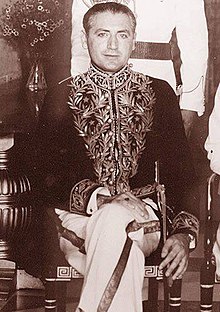
Back ميغيل سيرانو Arabic ميجيل سيرانو ARZ Miguel Serrano German Μιγκέλ Σεράνο Greek Miguel Serrano Fernández Spanish میگوئل سرانو Persian Miguel Serrano Finnish Miguel Serrano French Miguel Serrano Interlingue Miguel Serrano Italian
Miguel Serrano Fernández | |
|---|---|
 As ambassador to India, 1957 | |
| Born | Miguel Joaquín Diego del Carmen Serrano Fernández 10 September 1917 Santiago, Chile |
| Died | 28 February 2009 (aged 91) Santiago, Chile |
| Resting place | Santiago, Chile |
| Alma mater | Internado Nacional Barros Arana |
| Occupation(s) | Writer, novelist, essayist, journalist, explorer and diplomat |
| Years active | 1936–2009[1] |
| Notable work | "The Serpent of Paradise" "The Ultimate Flower" "El/Ella: Book of Magic Love" "The Visits of the Queen of Sheba" "C.G. Jung and Hermann Hesse: A Record of Two Friendships" "Nos: Book of the Resurrection" "Adolf Hitler: The Last Avatar" |
| Movement | Generation of '38 |
Miguel Joaquín Diego del Carmen Serrano Fernández, known as Miguel Serrano (10 September 1917 – 28 February 2009), was a Chilean diplomat, writer, neopagan occultist,[2] and fascist activist. A Nazi sympathiser in the late 1930s and early 1940s, he later became a prominent figure in the neo-Nazi movement as an exponent of Esoteric Hitlerism.
Born to a wealthy Chilean family of European descent, Serrano was orphaned as a child and raised by his grandmother. After an education at the Internado Nacional Barros Arana, he developed an interest in writing and far-right politics, allying himself with the National Socialist Movement of Chile. During the Second World War, in which Chile remained neutral until 1943, Serrano campaigned in support of Nazi Germany and promoted antisemitic conspiracy theories through his own fortnightly publication, La Nueva Edad. In 1942, he joined an occult order founded by a German immigrant which combined pro-Nazi sentiment with ceremonial magic and kundalini yoga. It presented the Nazi German leader Adolf Hitler as a spiritual adept who had incarnated to Earth as a savior of the Aryan race and who would lead humanity out of a dark age known as the Kali Yuga. Serrano became convinced that Hitler had not died in 1945 but had secretly survived and was living in Antarctica. After visiting Antarctica, Serrano travelled to Germany and then Switzerland, where he met the novelist Hermann Hesse and psychoanalyst Carl Jung; in 1965, he published a reminiscence of his time with the pair.
In 1953, Serrano joined the Chilean diplomatic corps and was stationed in India until 1963, where he took a keen interest in Hinduism and wrote several books. He was later made ambassador to Yugoslavia and then Austria, and while in Europe made contacts with various former Nazis and other far-rightists living on the continent. Following Chile's election of a Marxist President, Salvador Allende, Serrano was dismissed from the diplomatic service in 1970. After Allende was ousted in a coup and Augusto Pinochet took power, Serrano returned to Chile in 1973. He became a prominent organiser in the Chilean neo-Nazi movement, holding annual celebrations of Hitler's birthday, organising a neo-Nazi rally in Santiago, and producing a neo-Nazi political manifesto. He wrote a trilogy of books on Hitler in which he outlined his view of the Nazi leader as an avatar. He remained in contact with neo-Nazis elsewhere in the world and gave interviews to various foreign far-right publications.
In 2008, Serrano was awarded the Lifetime Achievement Award (Premio a la Trayectoria) from the Universidad Mayor of Santiago.[3][4][5] After Savitri Devi, he has been considered the most prominent exponent of Esoteric Hitlerism within the neo-Nazi movement. In that movement, he gained respect for his devotion to the cause even among neo-Nazis who regarded his ideas as far-fetched.
- ^ Quintela, EB Libros Sabela P. "MIGUEL SERRANO – EB Libros – Obra – Bibliografía".
- ^ Versluis A. Savitri Devi, Miguel Serrano and the global phenomenon of esoteric Hitlerism. In: Bogdan H, Djurdjevic G, eds. Occultism in a Global Perspective. Approaches to New Religions. Acumen Publishing; 2013:121-134.
- ^ Vida, Cronología, 2007–2009: Despedida, Official website
- ^ xvi feria del libro usado ya está abierta al público amante de la lectura Archived 12 June 2018 at the Wayback Machine, El Marino, 2 February 2008
- ^ Escritores María Cristina Menares, Rosa Cruchaga y Miguel Serrano fueron galardonados este año con el premio a la trayectoria., El Mostrador, 14 February 2008